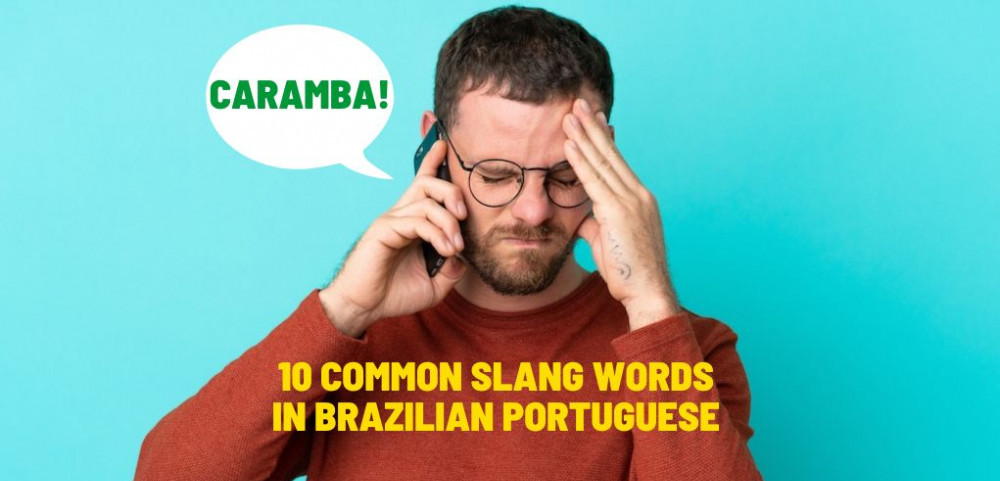Some links on this site are affiliate links, which means we may earn a small commission if you make a purchase using the link. This commission comes at no additional cost to you and helps to support the maintenance and development of this website.

Brazilian people are world-renowned for being welcoming, laid back, and casual. Given this tendency to informality, it’s no surprise that they love using slang in their conversations. In fact, it’s such an integral part of communication in Brazil that you may not even be able to fully understand a conversation if you’re not aware of the most commonly used expressions. Whether talking with strangers or chatting with long-time friends, in a business environment, or in the bar drinking sugarcane juice and listening to some Bossa Nova, you’ll hear slang being used left and right if you visit Brazil or watch a Brazilian movie. The prevalence of informal speech among brasileiros, makes learning and understanding these expressions absolutely important if you wish to fully understand Portuguese. So if you want to start learning some of them right away, check out this list of 10 common slang words and expressions used in Brazilian Portuguese:
1) Cara
We start off with “cara”, which is probably the most commonly used word in this entire list, used by Brazilians of all ages from Oiapoque to Chuí (respectively the northernmost and southernmost cities in Brazil). Cara is a very polyvalent word that has different meanings depending on the context and the speaker’s tone of voice.
1. Dude
“Cara” is mostly used similarly to how “dude” is used in English, to refer to a man in a colloquial manner. It is mostly used among friends, but you may also use it with someone you’ve just met.
Some variants of “cara” which also bear the same meaning as “dude” are:
- Bicho: mainly used by older people (>50 years old)
- Bróder/bro: Brazilian variation of the English word “brother”.
- Irmão: “brother” in Portuguese
- Parceiro
- Mano
- Mermão: contraction of “meu irmão” (my brother). More common in Rio de Janeiro.
- Meu: commonly used in São Paulo. Literally means “my” or “mine”.
- Velho/véi: literally means “old”. It’s commonly used among friends. Mostly used in the state of São Paulo, but it’s more or less common throughout the entire country
2. Face
“Cara” can be used to colloquially mean “face”, as in the following sentence:
- “Por quê você está com essa cara de nojo?” → “Why do you have this disgusted look on your face?”
3. Guy
“Cara” can also be used to refer to an unknown or unidentified man, similar to the word “guy” or “dude” in English.
- “Quem é aquele cara ali olhando pra gente?” → “Who’s that guy over there looking at us?”
4. Filler Word
Finally, “cara” may also be used as a filler word. Similar to when English speakers say “hmm”.
- Como você está hoje? → How are you today?
- Cara… estou bem. → Hmm… I’m good.
2) Cara de pau
As you can see, our second expression has the word “cara” in it. In this context, it’s the second meaning we learned for “cara”, meaning face. “Pau” means wood, so “cara de pau” literally means wooden face.
Imagine a person who has just done something wrong, something they shouldn’t have done, and when confronted about it, they deny it or act as if nothing happened. That person might be called “cara de pau” because they show no sign of guilt or remorse on their face. It’s as if their face is made of wood, unable to express any emotion.
This phrase is used to describe someone that is shameless and that has no problem taking advantage of other people. There was a Brazilian TV show from the early 2010s called “Os Caras de Pau”, starring a comedic duo comprised of two guys, Pedrão e Jorginho, and the show revolved around the two of them trying to get out of various troubles they got themselves in. It was a pretty hilarious show, and I recommend you give it a watch if you want to improve your Portuguese or if you just want to have a good old belly laugh.
- Você viu que o João furou a fila? Que cara de pau! → Did you see that João jumped the queue? So shameless!


If you’re looking for a fun and engaging way to learn Brazilian Portuguese, LingoPie is the perfect solution for you! LingoPie is an online platform that provides access to a wide range of TV shows and movies in Brazilian Portuguese, along with subtitles in English or Portuguese. Watching TV shows and movies is an enjoyable way to immerse yourself in the language and culture of Brazil. You can learn new vocabulary and grammar structures in context, which makes it easier to remember and apply them in real-life situations, while improving your listening skills and developing an ear for the language.
3) Gato(a)
The word “gato” literally means “cat”, but it’s also an expression used to describe a good-looking individual. “Gato” for men and “gata” for women.
- A Ana é uma gata! → Ana is so good-looking!

4) Maneiro
Variants: legal, bacana, irado, sinistro, brabo
Maneiro means “nice”, “cool” and it is a word that you can use when you want to show approval of something, or when you want to show appreciation for something that your interlocutor said. It can be applied to objects and people.
Here are some examples:
- Eu consegui um emprego novo. → I got a new job.
- Maneiro, cara! → Nice, man!
Similarly to “cara”, this word also has a myriad of synonyms such as:
- Legal
- Bacana
More commonly used by younger generations are:
- Irad
- Sinistro: literally means “sinister”, but in this case, “sinistro” has a positive connotation, like how “sick” may be used in English to describe something nice, or impressive. “Sick skateboard man!”
- Brabo: derived from “bravo”
5) Perrengue
If you ever come to Brazil I hope you don’t get yourself in a perrengue! This is a popular Brazilian expression that refers to a difficult, uncomfortable, or challenging situation. It can be used to describe a variety of situations, from minor inconveniences to more serious problems. It is an informal word for a problem in your life, a pickle that you’re having to deal with.
- Estou enfrentando um perrengue financeiro. → I’m facing a financial struggle.
- Meu pneu furou na Ponte Rio-Niterói. → I got a flat tire on the Rio-Niterói bridge.
- Que perrengue, mano! → What a pickle, man!

6) Pagar mico
“Pagar um mico” is a Brazilian expression that means to do something embarrassing or foolish that causes you to look bad in front of others. The expression “pagar um mico” is often used in a lighthearted or self-deprecating manner, as a way of acknowledging a mistake or mishap and trying to laugh it off. However, it can also be used in a more serious or critical context, to describe someone who consistently behaves in a foolish or embarrassing manner.
“Pagar mico” or “pagar um mico” literally means “to pay a monkey”. “Pagar” means “to pay” and “mico” means “monkey” (the word macaco is much more commonly used though). So this expression is often used to refer to someone that is making a fool of themselves. It may also be used when someone is breaking a social norm. Therefore, if you see someone dancing in public in broad light you may hear some people saying that they are “pagando um mico“. Or if a person attends a wedding wearing crocs and shorts then you can safely say that they are “pagando um mico”! The word “mico” can also be used by itself without necessarily being accompanied by the word “pagar” and in this case, it refers to the shameful situation itself, such as in:
- Ela pagou um micão quando a onda do mar levou o biquíni dela. → She was very embarrassed when the waves on the beach took her bikini away.
“Mico” can also be used in its augmentative form: “micão” and it means an even more shameful situation than a regular-sized “mico”.

7) Pra caramba
“Pra caramba” is an expression used to emphasize a certain phrase or word, similar to “really” and “a lot” in English. So if you want to emphasize that you think someone is really annoying you would say:
- Esse cara é chato pra caramba! → This guy is really boring!
Or, if you wish to emphasize how hot a day it is (something you’ll be saying a lot if you visit Brazil), you could say:
- Hoje ta calor para caramba! → Today is really hot!
The word “caramba” itself is an interjection that can be used to express surprise, admiration, annoyance, or even dismay (ever wondered what Bart Simpson meant when he said: “Ay caramba”?)
- O Brasil perdeu de 7 a 1 para a Alemanha na Copa do Mundo. → Brazil lost 7-1 to Germany in the World Cup.
- Caramba! → Damn!
8) Putz
This one is pretty interesting because if you hear it, it doesn’t really sound like a Brazilian Portuguese word at all, it actually kind of sounds German. However, it’s indeed very Brazilian. Brazilians use the word “putz” to express shock, usually negatively, as well as annoyance and astonishment, it’s something you could say while you facepalm. Equivalent words in English are:
- Dang it!
- Darn it!
- Jeez!
- Oh no!
Here are some examples of it being used in a phrase:
- Putz, esqueci de tirar a torta do forno. → Dang it, I forgot to take the pie out of the oven.
You may also hear people saying “putz grila” which is pretty much the same thing, you just add the “grila” at the end. “Grila” is not even a word in Portuguese so “putz grila” doesn’t have any additional meaning in relation to just “putz”, it’s just a different way of saying it, more commonly used by older people.

9) Rolê
This one is mostly used by younger generations, so if you’re a young learner yourself, or not so young anymore but you want to sound cool with the youngsters, you might wanna remember it.
“Rolê” is a Brazilian Portuguese slang term that refers to a leisurely stroll or hanging out with friends. It can also refer to a casual or spontaneous activity that doesn’t necessarily have a specific purpose or destination. A “rolê” can be pretty much anything related to having fun and socializing.
Overall, it’s a flexible and versatile term that’s often used to describe a wide range of social activities in Brazil.
- Eu vou dar um rolê no parque, até mais. → I’m going for a stroll in the park, see you later.
- Eu estou saindo com os meus amigos, te ligo mais tarde. → I’m hanging out with my friends, I’ll call you later.

10) Valeu
Valeu is another popular slang that is super common in Brazil. This word is used as a way of saying “thank you” and it is widely used by people of all ages across the entire country. “Valeu” comes from the verb “valer” which means “to be worth” or “to be valued”. In this sense, “valeu” can be interpreted as a way of saying “that was worth it” or “that was valuable.” It is an informal way of saying “obrigado” in Brazilian Portuguese. Sometimes Brazilians combine the two (Valeu, obrigado!). Overall, “valeu” is a versatile expression that reflects the informal and friendly culture of Brazil. It is widely used and understood among Portuguese speakers, particularly in Brazil, and is an important part of everyday communication in many contexts.
- Valeu pela ajuda, Carlos. → Thanks for the help, Carlos.
Is also a way of saying goodbye:
- Valeu, rapaziada, até a próxima. → Bye guys, see you later.

To learn Brazilian slang, the most effective method is to practice with a native speaker. Start your language learning journey today by finding a tutor on italki!
Written by Vinícius Lutterbach
Thanks for your post on Brazilian Portuguese slang words.
This is really helpful and cool to see how these can be used quite easily when trying to communicate with others in these countries.
I like how you have given a clear, concise explanation and examples for each word. These are helpful and remind me of my travelling days when attempting to communicate with the locals in foreign countries. I travelled to Spain, which is the most similar to Portuguese that I have experienced and really enjoyed my time learning the language.
Thanks for your post.
Thanks for your comment, Dale. I’m glad you enjoyed this post! Brazilian Portuguese has a rich vocabulary of slang words and expressions, which are used frequently in informal speech.
I agree with you about the importance of understanding the cultural context in which these slang words are used and I think the list of slang words and phrases is super helpful, and I love that the article includes audio recordings so that learners can practice their pronunciation.
In your opinion, what are some other effective ways to learn colloquial language and slang when studying a new language? Thank you.
I’m glad to hear that you found the list of slang words and phrases helpful. Understanding the cultural context of slang words and phrases is crucial for using them appropriately in real-life situations.
I believe immersion is an effective way to learn colloquial language and slang. Watching movies or TV shows in the language, or listening to music in the language, or conversing with natives. These are all great ways to learn how learn how slang words are used in context. It can be advantageous to have a language partner who can offer practical examples of how slang is utilized in real-life scenarios